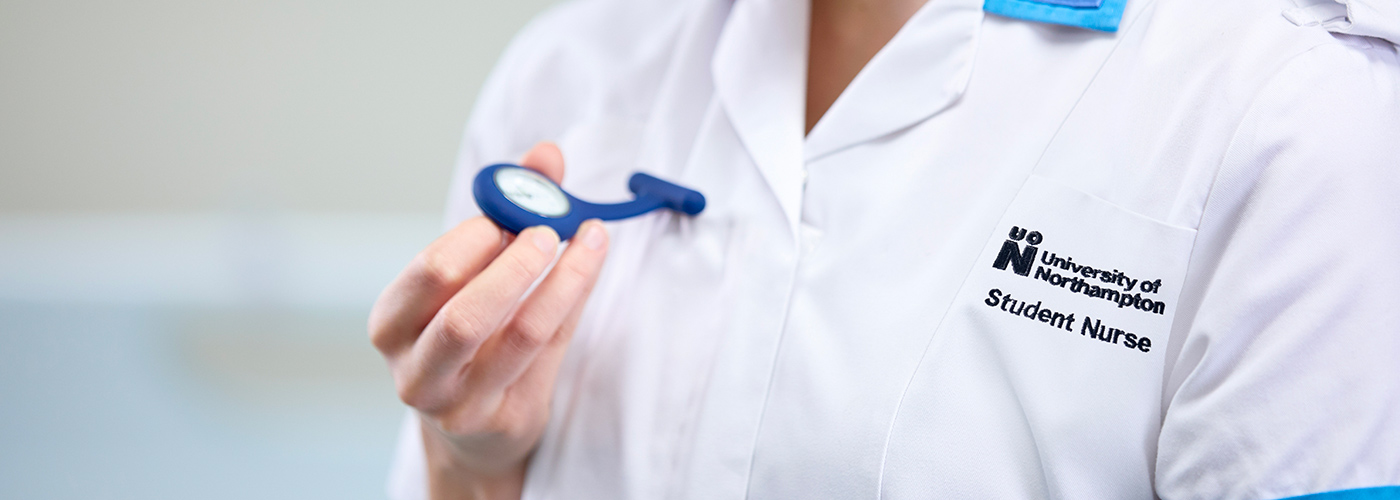Katie Archer

Nursing Associate FdSc
View the course- Year of study: Second year (in 2022/23)
- Length of course: Two years
Your University to Career Journey
Why did you decide to study at the University of Northampton?
My course is an apprenticeship paired with Milton Keynes University Hospital. When I started the course, the University of Northampton was the new university that had recently been switched in to run the programme.
What are your career goals/aspirations?
I hope to become a fully qualified registered nurse. I’m still very undecided on my field-specific area, as my current Nursing Associate role which I’m training for is cross-field.
How do you think your studies will help your career or personal development when you graduate?
Studying this course gives me an entrance into the pathway to becoming a nurse, whilst also getting more hands-on experience within the hospital than I would with the full nursing student course. When I graduate, I’m hoping to complete the Top-Up course, which allows me to study for an extra 18 months in order to become a registered nurse.
Which, if any, skills and knowledge/understanding gained on your degree do you feel will be most useful in your future career?
Every practical skill I’m taught, both on my base ward and at University, is applicable to my future career, as well as the knowledge I’m taught at University. Everything that I’m currently being taught is the foundation work and will be what I expand on as I study further and experience more.
Your Placement
Have you completed a placement? Please detail where this was, the role and an outline of your duties.
Yes, as the course is an apprenticeship, I have a permanent placement on Ward 15 at Milton Keynes University Hospital, which I attend every week to complete my required weekly hours and practice my clinical skills. I also attend two or three two-week placements throughout the year in which I’m moved to another area of the hospital to diversify my experience. So far, I’ve had placements in Endoscopy, where I was paired with the nurses in the procedure rooms and taught how to set up and clean the scopes, how to take admissions, look after patients in recovery and discharge patients from the unit. Then my second placement was on Ward 20, which is a ward for patients pre and post-operation. Again, I was with the nursing team, learning medication administration and changing a variety of dressings.
Please describe how your placement benefitted you?
My placements allowed me to see how my already acquired clinical skills could be applied in a variety of areas throughout the hospital, as well as allowing me to experience other types of nursing that I could potentially work in which I’d never considered before.
What employability skills did you develop during your placement?
My placements allowed me to continue to develop my person-centred care and communication skills. As well as this, alternating between different areas of the hospital has allowed me to develop how I adapt to change – not only in changes in environment, but in the people I’m working with. Not all teams have been as welcoming and accepting of students as my base ward has been, so it was difficult to adjust to those differing environments and was definitely a learning experience.
How do you think the placements will help you with gaining employment after graduating?
My placements have demonstrated areas in which I know I’d definitely prefer not to work. They have also rounded me as an individual, developing my overall holistic patient care and people skills.
Do you have any tips on applying for or getting the most benefit from your placement?
To get the most out of your placement, you need to make yourself as available as possible. Make sure you’re open to trying everything that’s offered – some things may be out of your comfort zone but if you feel you have enough support around you to push yourself, your experience will be as full as it can be. Try to make yourself as noticeable as possible.
What advice would you give a student about to begin a placement?
Before you start a placement, ensure that you’ve researched the clinical area you’re about to go into. For example, if you’re going to a respiratory ward, make sure you know the respiratory system and have an understanding of common respiratory illnesses. Make sure you’re always on time, are open and friendly to staff, and are willing to help when asked. As well as taking as many opportunities as possible, you should know your limits and if you don’t feel comfortable to undertake a task, don’t do it, as you may put yourself, the patient and the nurse you are with, in danger. Overall, just make sure you have fun and enjoy the experience as much as you possibly can.
Your Advice
In one sentence, what advice would you give to undergraduates interested in this career path or anything you wish you had known earlier?
Before coming onto the course, make sure you’re fully up for everything it has to offer and prepare yourself – it’s not easy but it’s definitely worth it!
In ten words, or less how would you summarise your UON experience?
Supportive, professional, exciting.